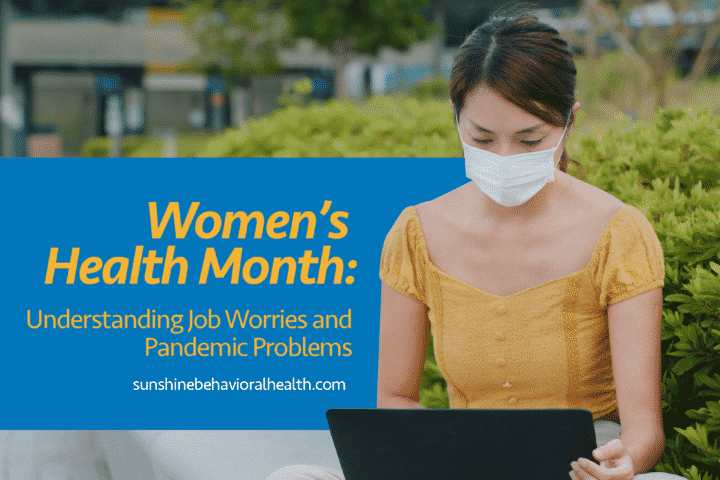
Women’s Health Month: Understanding Job Worries and Pandemic Problems
COVID-19 and the resulting pandemic have been difficult for most people. They’ve been particularly difficult for women.
Women’s Mental Health Month has always acknowledged that women’s mental health is just as important as their physical health. That’s true now more than ever.
How the pandemic has affected women’s work
The pandemic has shut down or slowed workplaces, especially in positions that have traditionally had large percentages of female workers — such as jobs in food service, retail, and fields that serve the public.
Some people called job losses and economic worries among women a “she-cession,” a play on the word recession.
These jobs often don’t give employees paid time off or the opportunity to work from home. If these employees with these jobs continue to go to work, their jobs could expose them to several strangers. This contact could create higher risks of contracting the highly contagious coronavirus that causes COVID-19 or its even more dangerous variants.
But if people with these jobs contract the virus and come down with COVID-19, they might not have sick days or other paid time off, so they could lose their jobs when they became sick. Adding to the pain, many of these jobs don’t have health insurance benefits or have poor benefits, making medical care expensive and possibly difficult to access.
If these women have children, they may be forced to make a choice between working in jobs that endanger their health and their families’ health and staying home to care for children but not receiving much-needed income.
Many women have stayed home because they didn’t have child care assistance and have left or lost their jobs.
Because of the pandemic, caring for children at home might be an even greater necessity. Several schools and day care providers have closed their brick-and-mortar buildings. Many schools have gone online. Mothers sometimes also have to be teachers, and some leave or lose their jobs because they don’t have the job flexibility and tools to do both.
How the pandemic has affected people differently
It appears that such economic factors are affecting many women. According to the Bureau of Labor Statistics, 156,000 U.S. women lost jobs in December 2020 alone. The bureau estimates that from March 2020 to January 2021, over 2.3 million female workers left the U.S. labor force.
As with other economic and health factors, minorities have been most harmed by job losses. In early January 2021, the unemployment rates for U.S. women were:
- Latina women: 9.1%
- Black women: 8.4%
- White women: 5.7%
Too often, women feel the pressure to be everything for everyone. Everyone, that is, except for themselves. This pressure can cause stress, anxiety, and depression, contribute to substance abuse, addiction, and eating disorders, and cause or worsen other mental and physical conditions.
Since the problems are complicated, there aren’t easy ways to solve them. But maybe a good first step would be acknowledging that they exist and showing compassion to people who have them. It’s important not to downplay mental health and stigmatize people who struggle with it.
These are truly stressful times and some people are struggling. Mental health problems are common, and it’s okay to admit them.
It’s not okay to shame others, though. Shame might make people more reluctant to talk about issues that can be difficult to discuss even under more positive circumstances.
Despite the popular saying about COVID-19 and the pandemic, we’re not really all in this together, at least in some ways. We might be facing different problems, or we might have similar problems but we might have different tools and solutions at our disposal.
But we all have the capacity to understand what others are experiencing while providing compassion and support. Even if we can’t fix things entirely, we can practice kindness and understanding, to help make things a little better instead of making them worse.
Sources
nbcnews.com – About 275,000 Women Left Workforce in January in “Critical” Pandemic Trend, Experts Say
news4jax.com – COVID Pandemic Tougher on Women’s Mental Health, Experts Say
cnn.com – The U.S. Economy Lost 140,000 Jobs in December. All of Them Were Held by Women
sunshinebehavioralhealth.com – How Eating Disorders Co-Occur with Substance Abuse
A Message From Our CEO
Medical disclaimer:
Sunshine Behavioral Health strives to help people who are facing substance abuse, addiction, mental health disorders, or a combination of these conditions. It does this by providing compassionate care and evidence-based content that addresses health, treatment, and recovery.
Licensed medical professionals review material we publish on our site. The material is not a substitute for qualified medical diagnoses, treatment, or advice. It should not be used to replace the suggestions of your personal physician or other health care professionals.





